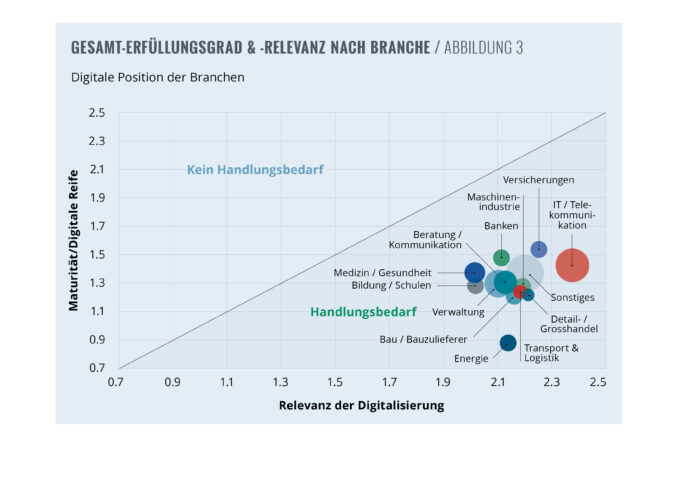Only a third of Swiss companies are digitally on track
A new study conducted by swissICT in collaboration with two universities of applied sciences examines the digital maturity of the Swiss economy and administration. The result: two thirds of companies need to take action in the area of digitalization.

"How fit is my organization when it comes to digital transformation?" Many managers in Swiss companies and administrations ask themselves. The digital maturity level provides the answer by looking inwards and comparing with the industry. In cooperation with swssICT, a team of researchers from Bern University of Applied Sciences and the University of Applied Sciences Northwestern Switzerland has conducted a study entitled "Digital Excellence Report 2023" was written. Based on the self-assessment of companies and administrations, the report sheds light on the digital maturity of Switzerland as a workplace.
Basics of the study
The companies' digital maturity levels were surveyed in a self-assessment based on the "Digital Excellence Checkup", which examines seven maturity dimensions, as swissICT writes. In order to determine the need for action on digitalization, the assessment of relevance and the assessment of the companies' own maturity were compared. Where maturity is low and relevance is high, the authors assume a high need for action. Conversely, similar values in the relevance assessment and the maturity assessment would indicate that organizations are on track according to their self-assessment.
There is a need for action in all sectors
According to the report, the authors analyzed data from over 600 Swiss companies and over 1,300 survey participants. The evaluation shows a surprisingly homogeneous, but at the same time worrying picture: There is a significant need for action in all sectors.
A quarter of the organizations have a very great need for action. The greatest need for action is in the dimensions of "strategy and transformation management" and "data". "Of all the questions that the participants answered, the one with the lowest fulfillment values is the one that measures the existence of measurable transformation goals in the company and the pursuit of these goals," notes Prof. Bramwell Kaltenrieder, project manager of the study. "Against this backdrop, it is not surprising that the digital status quo and digital ambition are still far apart in two thirds of companies."
Big differences
A third of companies are on track, writes swissICT. One percent of organizations are even well advanced, while a quarter of companies have a very great need for action. According to the ICT association, three groups of companies can be distinguished:
- The first group of companies (35%) is coping well with the digital transformation. They have mastered the challenges successfully so far - a few even excellently. This group of digitally well-positioned companies is dominated by companies for which the digital transformation is of medium relevance and which have achieved a medium level of maturity.
- The second group (39%) consists of companies that have smaller but accumulating deficits. Half of these companies consider digital transformation to be particularly relevant, while the other half consider it to be of average relevance.
- The third group (26%) consists of companies that are far from the targeted level of transformation. It is characteristic of companies with a great need for action that the digital transformation is of above-average relevance to them, but they still belong to the last fifth in terms of maturity.
Christian Hunziker, Managing Director of swissICT, is surprised: "Switzerland is currently well ahead in international rankings for various topics. The fact that we have such a need for action in digital transformation shows that swissICT's commitment is needed more than ever!" Digital transformation means leadership responsibility and the report shows how sensitive the situation is in the Swiss workplace, says Hunziker.









